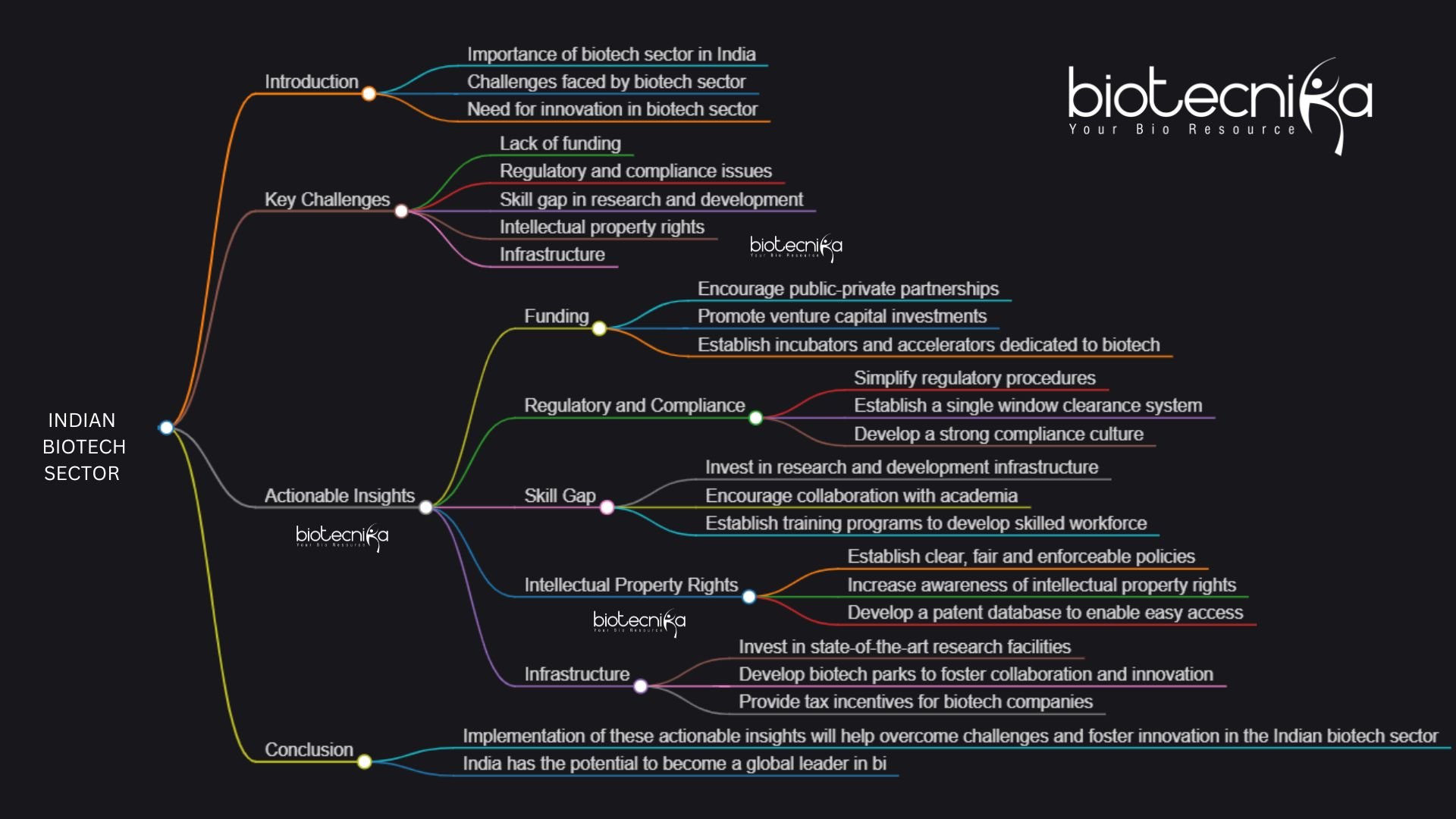Overcoming Challenges in Indian Biotech Sector & Fostering Innovation
The Indian biotech sector holds immense promise for growth and innovation, yet it faces several challenges that need to be addressed to fully realize its potential. From shortcomings in academic training and coordination to the need to attract top talent in successful startups, entrepreneurs in the biotech industry must navigate complex regulatory frameworks, engage with stakeholders, and align with investors for successful innovation.
In this article, we delve into the key challenges faced by the Indian biotech sector and provide actionable insights and examples to help entrepreneurs overcome these hurdles and foster a thriving ecosystem.
1. Strengthening Academic Training and Startup Success:
Academic training forms the foundation of the biotech sector. However, there is a need to bridge the gap between academia and industry to foster successful startups. For example, universities can establish dedicated entrepreneurship programs that provide students with the necessary business skills and mentorship to transform their innovative ideas into commercially viable ventures. By promoting interdisciplinary collaboration and offering seed funding opportunities, universities can cultivate a culture of innovation
and entrepreneurship.
Actionable Insight: Entrepreneurs should actively engage with universities and research institutes to tap into their resources, collaborate on research projects, and access state-of-the-art facilities. Building strong relationships between academia and startups can enhance academic bio-entrepreneurship and expedite the translation of research into impactful solutions.


2. Strengthening Research and Development Infrastructure:
Investing in research and development (R&D) infrastructure is essential to drive innovation in the biotech sector. The Indian government, along with industry stakeholders, should focus on establishing state-of-the-art research facilities and centers of excellence. This includes equipping laboratories with cutting-edge technologies, promoting collaboration between academia and industry, and providing adequate funding for research projects. By enhancing the R&D infrastructure, India can attract top talent, encourage innovation, and pave the way for breakthrough discoveries.
[embedded content]
3. Navigating Regulatory Frameworks for Entrepreneurial Success:
Regulatory frameworks play a critical role in the biotech sector, ensuring the safety and efficacy of products. Entrepreneurs must understand the specific regulatory requirements relevant to their innovations and seek guidance from experts in the field. One exemplary initiative is the establishment of regulatory sandboxes, where entrepreneurs can test their ideas within a controlled environment, receiving valuable feedback and guidance from regulatory authorities.
Actionable Insight: Entrepreneurs should proactively engage with regulatory bodies, participating in consultation processes and seeking early interactions to better understand and comply with regulatory requirements. Collaborative efforts between entrepreneurs, regulators, and industry associations can facilitate the creation of streamlined regulatory pathways, fostering innovation while ensuring public safety.
4. Encouraging Bio-Entrepreneurship and Startups:
To foster innovation, it is vital to create a conducive environment for biotech entrepreneurship and startups. The Indian government should introduce policies that ease the regulatory burden, provide tax incentives, and facilitate access to funding for biotech startups. Promoting incubation centers and accelerators specifically tailored to the biotech sector can nurture early-stage companies and help them transform innovative ideas into successful businesses. Additionally, mentorship programs and networking platforms can provide guidance and support to aspiring entrepreneurs.
5. Investing in Skill Development:
A skilled workforce is essential for driving innovation in the biotech sector. The government, along with industry associations, should focus on investing in skill development programs that cater to the specific needs of the biotech industry. This includes providing specialized training in areas such as genomics, bioinformatics, and clinical research. By enhancing the skill set of professionals, India can build a talent pool that meets the demands of a rapidly evolving biotech sector.
6. Agricultural Biotechnology: Optimizing Resources for Sustainable Impact:
The lack of clear regulatory pathways in agricultural biotechnology has resulted in the inefficient utilization of public funds and human resources. One potential solution is the implementation of outcome-based regulations that focus on the safety and environmental impact of products rather than rigid pre-determined approval processes. By adopting such flexible regulatory approaches, India can encourage innovation in agricultural biotechnology while ensuring responsible and sustainable practices.
Actionable Insight: Stakeholders, including entrepreneurs, researchers, and regulatory authorities, should collaborate to establish a robust regulatory framework that supports innovation while safeguarding the environment and public health. This can be achieved through proactive dialogue, data-sharing, and joint initiatives aimed at defining clear regulatory pathways.
7. Empowering Regulators for Informed Decision-Making:
Regulators play a crucial role in evaluating and approving biotech products. To make informed decisions about approval requirements, regulators must stay abreast of emerging technologies and scientific advancements. Training programs tailored to the specific needs of regulators can equip them with the knowledge and expertise required to evaluate complex biotech innovations effectively.
Actionable Insight: Regulatory authorities should prioritize ongoing training and professional development programs for their staff, focusing on emerging biotech areas such as gene editing, synthetic biology, and personalized medicine. Collaboration with academic institutions and industry experts can help design effective training modules that empower regulators to make informed decisions.
8. Encouraging Collaboration with Global Partners:
Collaborating with global partners can provide Indian biotech companies with access to international markets, technologies, and expertise. The government should actively promote international collaborations and partnerships through initiatives such as bilateral agreements, joint research programs, and participation in global conferences and exhibitions. Leveraging the strengths of global partners can accelerate innovation and help Indian biotech companies compete on a global scale.
In conclusion, the Indian biotech sector has immense potential for growth and innovation. By addressing the challenges and implementing actionable insights, India can position itself as a global biotech hub. Strengthening research infrastructure, enhancing IPR protection, promoting industry-academia collaboration, supporting startups, investing in skill development, facilitating regulatory reforms, and encouraging global partnerships are crucial steps towards overcoming challenges and fostering innovation in the Indian biotech sector.
Overcoming Challenges in Indian Biotech Sector & Fostering Innovation
[embedded content]
- SEO Powered Content & PR Distribution. Get Amplified Today.
- PlatoAiStream. Web3 Data Intelligence. Knowledge Amplified. Access Here.
- Minting the Future w Adryenn Ashley. Access Here.
- Buy and Sell Shares in PRE-IPO Companies with PREIPO®. Access Here.
- Source: https://www.biotecnika.org/2023/06/overcoming-challenges-in-indian-biotech-sector-insights/




